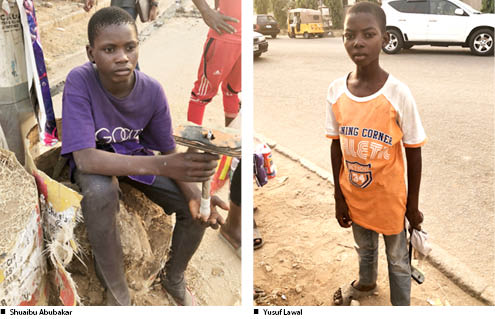Meet The Boys Always Waiting For Traffic Lights To Turn Red So They Can Wash Cars In Abuja (Photo)

On a warm Abuja evening, Yusuf Lawal, 12, stood by the side of road waiting for the traffic light to turn red before jumping onto the street to clean the windshield of the cars halted by the light. Sometimes he gets a token N10 or N20, other times he is shouted at or warned off by drivers not to touch their windshields.
Yusuf is not alone on these streets. Many boys like him take advantage of the traffic lights in Abuja to make small amounts of money.
The ‘car wash’ boys, as they call themselves, seem to come out of nowhere, quickly squirt liquid detergent from a plastic bottle onto the windshield, and use their local squeegee to give it a quick wipe down before the light turns green.
That was how I met Yusuf Lawal. I was heading home for the day and was stopped by the red light. There came a boy who looked to be no older than 10, rushing onto the road to clean the windshield of the car I was in. I parked and beckoned him to come. It turns out he was twelve and is working to help feed not only himself but his family as well.
“I come here from Mararaba every day after school to do this ‘car wash’ business. I usually make about N500 or even less, which I take home for my siblings, parents and I to eat with. I got into it when I saw some of my mates doing it, and in order to help my family at home, I decided to start too,” Yusuf said.
He then explained how he makes the journey everyday after school to make that small amount of money, before retiring for the day to give a chunk of what he’s made to his mum.
“My parents aren’t comfortable with what I do at all. They know how risky it is. But if I don’t do this, then there will be little or no food on the table, and I also won’t have money for transport to go to school the next day. So they don’t have much of a choice,” he said.
“I’m in primary three and I hope to become a doctor someday. After I close from school for the day by 3 o’clock, I come here right after, remove my uniform and hide it in a nearby bush. Then once it becomes dark and the traffic has reduced, we start heading home. Otherwise if we stay too late, we might not get a car to take us back,” he said.
It is a job that comes with risks. There is the constant threat of missing death or injury by inches and having to be on the lookout for people or things that may seem to want to harm them.
“We hear stories of how people are kidnapped and used for rituals, so we try to stay together so that we don’t expose ourselves to that too much. Also, there are a lot of drivers who feel like our lives aren’t worth much because they drive as if they want to hit us. God and our parents’ prayers are what protect us mostly,” Yusuf said.
He went on to talk about how some people call them all sorts of nasty names and throw insults at them for just trying to clean their windshields. “They could just tell us they don’t want it and we’ll leave them alone. It’s not a forceful thing.”
Another young ‘car wash’ boy I met went by the name Shuaibu Abubakar, a 16-year-old JSS1 student, who suffered a similar plight to Yusuf of having to go to school in the morning and then spending his evenings on one of Abuja’s busy streets.
“I school in Deidei, but come here to make some money to go home with. I use what I make to buy books and stationary like pencils which I use to study at school every term. Out of the N600 I usually make daily, I use N300 for my transport fare, then give the remaining at home to get what we need to eat,”Shuaibu said.
Smiling, he talked about how he someday hopes to become a soldier after completing his education. But then his smile disappeared as he told me he couldn’t seem to find a silver lining through which his dream could come true.
“I would want to save the money I get to see that become a reality, but it’s never even enough for anything apart from our daily feeding, talk less of doing so,” he said.
He then revealed how the Abuja Environmental Protection Board (AEPB), has made his life difficult in the course of his car wash travails. He was once carted away by operatives of the agency and kept locked up in a cell after being caught.
“I’ve been caught and locked up in a cell for three days. My mum had to borrow money from people to pay my bail of N15,000. They give us food in the palm of our hands that’s basically enough for just one swallow, and once a day,” he said.
In every car they chase and every windshield they clean, the likes of Yusuf and Shuaibu are pursuing their dreams of becoming either a soldier or a doctor. Hundreds of boys like them pound the streets of Abuja chasing these dreams, inching towards them with every swipe of their squeegee. But like the cars they clean to claw towards their dreams, their dreams seem to run away from them faster than they could run after them.








No comments: